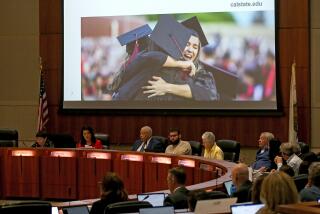States Seek More Say in Reshaping NYSE
- Share via
NEW YORK — Flexing newfound muscle, state finance officials are trying to win a bigger say in how the New York Stock Exchange reshapes itself after the ouster of Chairman Richard Grasso.
A delegation of some of the Big Board’s harshest critics, including California Treasurer Phil Angelides and the heads of the state’s two largest public pension funds, was scheduled to meet this morning with the NYSE’s special committee on corporate governance. The committee is preparing a report on ways to reform the nation’s largest and oldest stock market.
The 10-person delegation representing seven states planned to recommend, among other things, that the NYSE reduce the size of its board, enhance the independence of its directors and split the functions of regulating the exchange and running it.
The call for Grasso’s resignation by Angelides and Sean Harrigan, president of the board of the California Public Employees’ Retirement System, Jack Ehnes, chief executive of the California State Teachers’ Retirement System, and a handful of pension fund officials from other states, was widely seen as the tipping point that forced the NYSE board to ask Grasso to step down a day later, on Sept. 17.
“That sent a message to the board that the fire had spread well beyond Wall Street and that the exchange’s reputation was being tarnished among some very important constituencies,” said James J. Angel, associate professor of finance at Georgetown University.
Angelides, in an interview Tuesday, said that Grasso’s resignation was just the first step in a long process of restoring the exchange’s credibility and winning back investor confidence.
He did not specifically call for other NYSE directors to resign but said, “There’s a question whether this board has the credibility on its own to repair the damage.”
Grasso became the focus of public outrage after the NYSE disclosed in late August that he would take a $139.5-million lump-sum payout this year. The money represented deferred salary and pension earned over his 35-year career, but with the bulk of it coming since he became chairman in 1995. Grasso’s regular salary and bonus peaked at more than $30 million in 2001, even as a devastating bear market was eating into Wall Street profits and investors’ nest eggs.
The revelations caused critics to attack the 27-member NYSE board for conflicts of interest. Nearly half of the directors who voted on Grasso’s employment contracts, for example, ran companies that were subject to NYSE regulation.
Angelides recommended a “truly independent review” of the circumstances that led to the Grasso crisis.
Ehnes, in a letter Tuesday to the NYSE special committee, recommended that the NYSE board require a majority of independent directors -- that is, those with no employment or business ties to the exchange. He also said the exchange should have a separate chairman and chief executive. Grasso, following NYSE tradition, held both roles.
The special committee is co-chaired by NYSE director H. Carl McCall and former Clinton administration chief of staff Leon Panetta. The panel is scheduled to present its report to the Securities and Exchange Commission on Oct. 2, although some members have recommended postponing the deadline in order to give John Reed, the NYSE’s incoming interim chairman, more time to add recommendations.
Attending today’s meeting, in addition to Angelides, Harrigan and Ehnes, will be New York state Comptroller Alan G. Hevesi, New York City Comptroller William C. Thompson Jr., Connecticut Treasurer Denise L. Nappier, Iowa Treasurer Michael L. Fitzgerald, Kentucky Treasurer Jonathan Miller, North Carolina Treasurer Richard H. Moore and Oregon Treasurer Randall Edwards.
More to Read
Inside the business of entertainment
The Wide Shot brings you news, analysis and insights on everything from streaming wars to production — and what it all means for the future.
You may occasionally receive promotional content from the Los Angeles Times.










